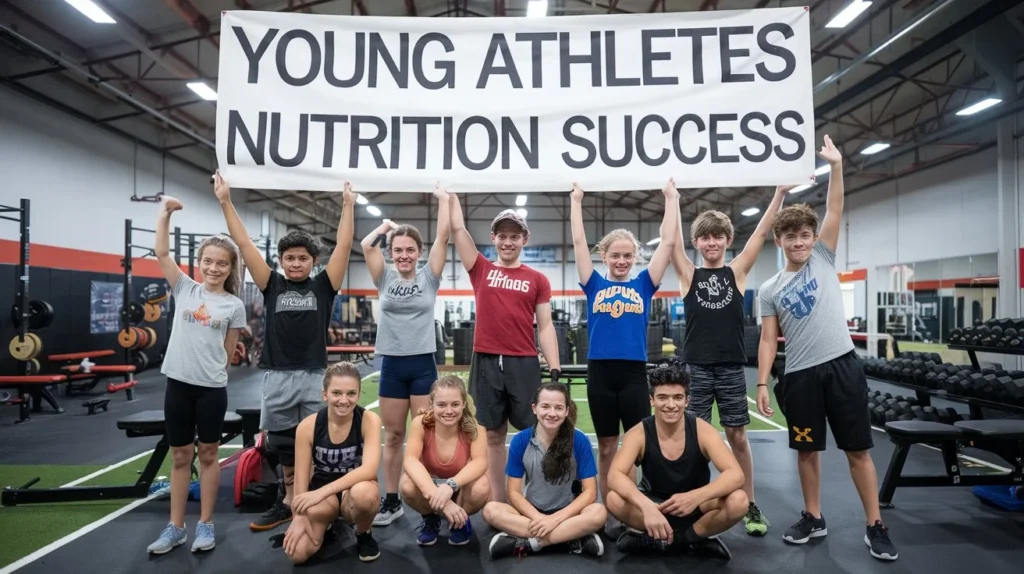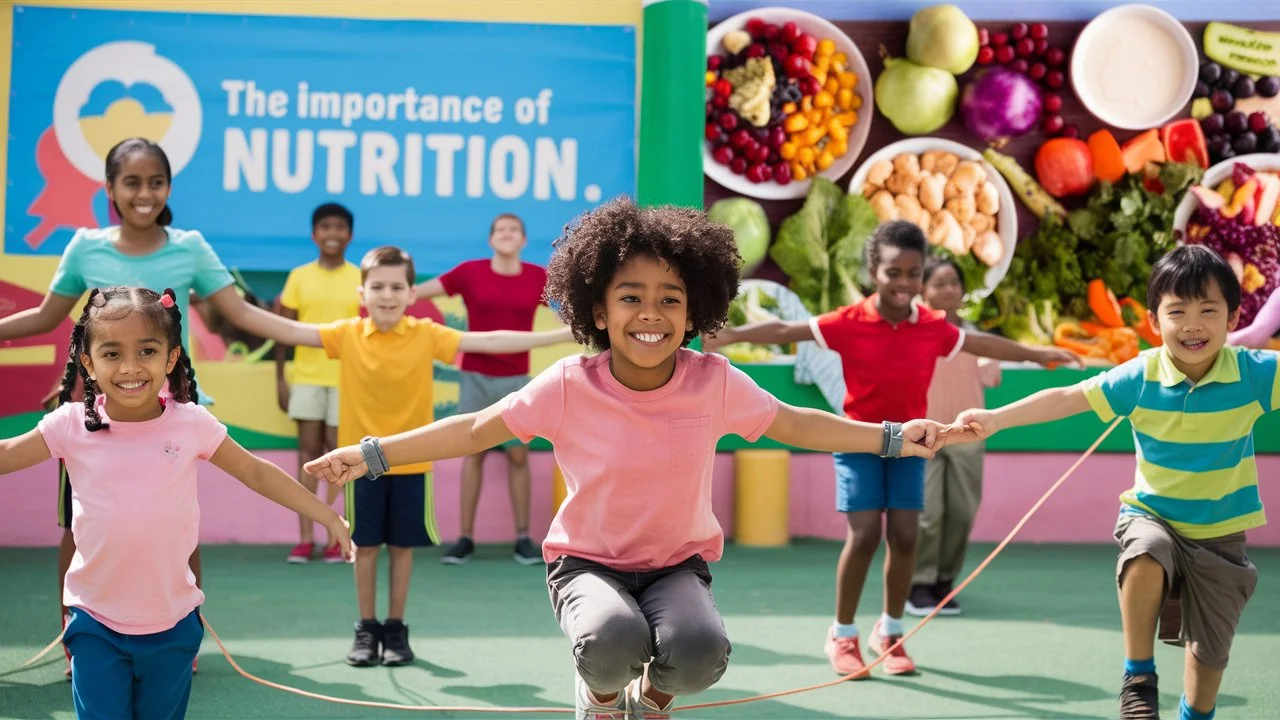Empowering Young Athletes Nutrition Success
Table of Contents
Introduction
You’re invested in your child’s success in sports, but helping them thrive goes beyond practice schedules and game days. Nutrition is foundational to their performance, growth, and health. Yet, meeting the dietary needs of young athletes requires understanding, commitment, and strategy. In this article, you’ll gain insights from cognitive research, uncover nutrient essentials, and explore strategies to make nutrition a priority in your child’s routine. Let’s dive into how you can fuel their potential.
Section 1: Understanding Nutritional Basics for Young Athletes
For young athletes, nutrition is about more than calories—it’s about giving their bodies the energy and nutrients required for peak performance. Each nutrient has a unique role:
- Carbohydrates: These are a child’s primary energy source, especially during high-intensity activities. You should aim to make 45-65% of their diet come from complex carbohydrates like whole grains, fruits, and vegetables.
- Protein: Protein is essential for muscle repair, growth, and strength. For young athletes, protein needs generally range from 0.5 to 0.8 grams per pound of body weight. Include lean meats, eggs, dairy, legumes, and plant-based proteins in their meals.
- Fats: Healthy fats are vital for brain development, long-term energy, and even inflammation reduction, which aids recovery. Good sources include nuts, seeds, avocados, and plant-based oils.
| Macronutrient | Role | Examples |
|---|---|---|
| Carbohydrates | Energy source | Whole grains, fruits, vegetables |
| Protein | Muscle repair and growth | Chicken, eggs, beans |
| Fats | Brain health, energy | Avocados, nuts, olive oil |

Section 2: Importance of Micronutrients in Athletic Development
While macronutrients provide energy, micronutrients are critical for young athletes’ growth, immune function, and injury prevention. Failing to meet these needs could impact performance and overall health. Here’s a breakdown of key micronutrients:
- Calcium and Vitamin D: Essential for bone health, calcium and vitamin D help prevent fractures and strengthen bones. Calcium is found in dairy products and leafy greens, while vitamin D can be sourced from sunlight and fortified foods.
- Iron: Iron supports oxygen transport in the blood, which is crucial for stamina. Deficiency can lead to fatigue, dizziness, and poor performance.
- Vitamin B12 and Folate: These B vitamins are vital for energy metabolism, helping your child convert food into usable energy. Meat, eggs, and dairy are good sources, while folate is found in leafy greens, beans, and fortified grains.
| Micronutrient | Importance | Examples |
|---|---|---|
| Calcium & Vitamin D | Bone health | Dairy, leafy greens, fortified milk |
| Iron | Oxygen transport, stamina | Red meat, spinach, beans |
| Vitamin B12 & Folate | Energy metabolism | Meat, eggs, dairy, leafy greens |
Section 3: Hydration and Its Impact on Performance
For young athletes, hydration is just as crucial as nutrition. Dehydration of even 1-2% of body weight can impair athletic performance, leading to fatigue, cramps, and loss of focus. According to the American Academy of Pediatrics, water should be the primary drink for hydration. Here are general guidelines for daily water intake during athletic activities:
| Age Group | Daily Water Needs During Activity |
|---|---|
| 6-12 years | 7-8 cups |
| 13-18 years | 8-11 cups |
Tips for Maintaining Hydration:
- Before Activity: Ensure your child drinks at least a glass of water 30-60 minutes prior to the activity.
- During Activity: Prompt your child to take brief water breaks every 15-20 minutes.
- After Activity: Rehydrate with water and, if needed, an electrolyte solution for prolonged activities.
Section 4: Nutritional Timing for Optimal Performance
Timing meals and snacks properly can have a substantial impact on your child’s performance and recovery. Here’s a strategic approach:
- 3-4 Hours Before Exercise: This meal should be well-balanced, combining carbs, proteins, and fats. It provides sustained energy without causing stomach discomfort.Example: A balanced meal could include chicken, rice, and steamed vegetables.
- 1-2 Hours Before Exercise: A light snack high in carbohydrates and moderate in protein can help prevent fatigue.Example: A banana paired with a handful of nuts, or a slice of whole-grain toast topped with peanut butter.
- Post-Exercise (30 Minutes to 1 Hour After): After intense activity, your child’s muscles need a mix of carbs and protein to recover.Example: Greek yogurt with berries or a smoothie with fruit, milk, and a protein source.
| Time | Meal Type | Examples |
|---|---|---|
| 3-4 hours before | Balanced meal | Chicken, rice, vegetables |
| 1-2 hours before | Light snack | Banana with nuts |
| Post-exercise | Recovery snack | Greek yogurt with berries |
Section 5: Recognizing and Preventing Common Nutritional Deficiencies
Despite your best efforts, young athletes may still encounter nutritional gaps that impact their performance. Identifying and addressing these deficiencies is essential.
| Deficiency | Symptoms | Sources |
|---|---|---|
| Iron | Fatigue, dizziness, shortness of breath | Red meat, spinach, fortified cereals |
| Calcium | Weak bones, muscle cramps | Dairy, leafy greens |
| Vitamin D | Low energy, muscle weakness | Fortified milk, sunlight exposure |
| Omega-3 Fatty Acids | Poor concentration, joint pain | Fish, flaxseeds, walnuts |
Preventive Tips:
- Encourage a variety of foods to cover all nutrient bases.
- Monitor your child’s energy and endurance. Lingering fatigue could signal a deficiency.
- Consult a healthcare professional if you suspect a nutrient deficiency.
Section 6: Cognitive Benefits of Good Nutrition for Young Athletes
Beyond physical benefits, a nutritious diet can improve cognitive function, which is critical for sports performance, academic focus, and overall mental well-being.
| Nutritional Factor | Cognitive Benefit | Outcome |
|---|---|---|
| Omega-3 Fatty Acids | Enhanced memory and concentration | Better focus during games and practice |
| B Vitamins | Improved cognitive processing | Faster reaction times and decision-making |
| Antioxidants | Reduced oxidative stress | Mental clarity and reduced fatigue |
Example Research Findings:
- Omega-3 Fatty Acids: Studies show that omega-3s found in fish oils and walnuts can enhance memory and focus. For athletic children, this means improved game-day focus and mental clarity during practice sessions.
- B Vitamins: Foods rich in B vitamins, such as eggs, milk, and fortified cereals, support brain function, particularly in high-stress and quick-reaction scenarios common in sports.
Section 7: Practical Tips for Encouraging Healthy Eating Habits
Making healthy nutrition a routine can be challenging for young athletes. Here are some practical tips:
- Involve Them in Planning: Encourage your child to help with meal planning and preparation. This builds an appreciation for nutritious foods.
- Make Hydration Fun: Add fruit slices to water for natural flavor, and offer fun water bottles that encourage frequent sipping.
- Prepare Snacks Ahead of Time: Keep a supply of nutritious snacks like cut vegetables, fruit, yogurt, and nuts on hand. Pre-packaging snacks helps them choose healthier options.
- Educate About the Benefits: Help your child understand why good nutrition matters for sports. Emphasize that foods fuel their bodies and brains for better performance.
Frequently Asked Questions
- What should my child eat before a game?
- Opt for a balanced meal of carbohydrates, proteins, and fats about 3-4 hours before the game. One to two hours before, give a smaller snack like a banana with peanut butter for quick energy.
- How much water should my child drink daily?
- For most young athletes, aim for 7-11 cups daily, with increased intake during intense activities. Encourage regular water breaks to keep them hydrated.
- Should I consider supplements for my child?
- If your child has a well-rounded diet, supplements may not be necessary. However, specific deficiencies like iron or vitamin D may require supplements under a doctor’s guidance.
- Are protein shakes safe for young athletes?
- Whole foods are preferable, but protein shakes can be useful occasionally when whole foods aren’t available. Just be mindful of added sugars and fillers.
- Can a child’s diet affect their focus in school and sports?
- Absolutely. Nutrient-rich foods, especially omega-3s and B vitamins, support cognitive functions like focus, memory, and decision-making, enhancing performance in both academics and sports.
Conclusion
By prioritizing balanced nutrition, you’re investing in your child’s athletic potential, cognitive growth, and long-term health. Through informed choices, consistent routines, and strategic meal planning, you’ll support their journey toward peak performance and wellness.
References
Research Journal Example, Author(s). (Year). Title. Journal Name, Volume(Issue), Pages.
American Academy of Pediatrics. (Year). Source Title. Publisher.
National Institutes of Health. (Year). Source Title. Publisher.







